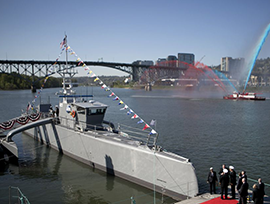A new autonomous drone vessel called ACTUV, which hunts unfriendly, difficult-to-find submarines for extended periods of time, has been made possible due to the fuel efficiency and reliability of 12V 2000 M94 MTU diesel engine systems supplied by Pacific Power Group. Commissioned by DARPA and created by Leidos, ACTUV was built by our Portland, Oregon-based shipmaker client Vigor Industrial, with whom we have successfully partnered on many previous marine defense projects.
Project Background
As relatively inexpensive and virtually silent diesel-electric submarines have quickly become one of the biggest threats to commercial shipping and industry, the U.S. Navy tasked the Defense Advanced Research Projects Agency, or DARPA, to help defend our nation’s $1.8 trillion of at-risk maritime commerce. DARPA is an agency of the US Department of Defense and is responsible for the development of emerging technologies for military use.
With a current cost of about $200 – 300 million, diesel-electric subs are now within reach of smaller, volatile countries. The greatest threat about these subs is they are too quiet to detect around normal oceanic shipping activity, “like trying to identify the sound of a single car engine in the din of a major city,” says Rear Admiral Frank Drennan, commander of the Naval Mine and Anti-Submarine Warfare Command.
The answer: a robot drone that will deploy for months, seeking out and tracking underwater threats for thousands of miles without human contact, keeping our troops out of harm’s way and minimizing risks to the marine ecosystem by limiting the use of sonar.
ACTUV Project Profile
 The Anti-Submarine Warfare (ASW) Continuous Trail Unmanned Vessel (or “ACTUV,” pronounced “active”) is the name of the unmanned vessel created by Leidos to “robustly track quiet diesel electric submarines,” according to DARPA. It is essentially an autonomous drone ship that can safely locate, track, and report back encounters to remote operators. Once a wide-area sensor provides an initial indication of a possible target, the ACTUV will rapidly “sprint” to the area and use its own sensors to assess the contact. A variety of sensors continuously track and analyze the target in several stages, eventually producing an “acoustic image” of the target to identify and classify the specific submarine with Naval operators. If a contact is determined not to be threatening, an operator can order the vessel to continue its regular patrol, or continue shadowing the submarine to deter it from acting aggressively.
The Anti-Submarine Warfare (ASW) Continuous Trail Unmanned Vessel (or “ACTUV,” pronounced “active”) is the name of the unmanned vessel created by Leidos to “robustly track quiet diesel electric submarines,” according to DARPA. It is essentially an autonomous drone ship that can safely locate, track, and report back encounters to remote operators. Once a wide-area sensor provides an initial indication of a possible target, the ACTUV will rapidly “sprint” to the area and use its own sensors to assess the contact. A variety of sensors continuously track and analyze the target in several stages, eventually producing an “acoustic image” of the target to identify and classify the specific submarine with Naval operators. If a contact is determined not to be threatening, an operator can order the vessel to continue its regular patrol, or continue shadowing the submarine to deter it from acting aggressively.
The cost of the project is also impressive. At $23 mil per vehicle, it is exponentially less than other naval vessels with similar capabilities. Operationally, ACTUV is expected to cost $15 – 20k per day, compared to $700,000 per day for a Naval destroyer. It is hoped that the low-cost and high vigilance of this project will help deter threats by making unfriendly stealth sub activity too ineffective to easily continue.
MTU Marine Engines Are Key
Most of DARPA’s project goals are achieved in large part due to the selection of MTU diesel marine engines, which meet requested criteria due to their high power density, power-to-weight ratio, compact design, and their mechanical and thermal stability. They are also easy to use and maintain, with low life-cycle costs resulting from their reliability and fuel efficiency. This ensures the ACTUV can be deployed for up to 90 days at a time, pausing only for a brief service period in between active operation. MTU engine systems have long been used by the defense industry because of their performance, but also because they are highly customizable with complex, combined propulsion solutions, capable of providing both propulsion and on-board system power.
Trusted Marine Defense Experts
Both Pacific Power Group and our partner MTU have worked with marine defense projects for decades, pooling our expertise to provide power systems for Naval, Coast Guard, law enforcement, and other government agencies both worldwide and in the Pacific Northwest. MTU systems are continuously recommended to and adopted by defense contractors due to their performance, reliability, economy, and environmental friendliness.
Contracted by long-time customer Vigor Industrial, our engineers spent over two years designing the engine system for this prototype, providing our insight on customization, 3D modeling, engineering and testing to provide recommendations and proof of concept in order to achieve the project goals. The prototype model was deployed in April 2016 from Vigor’s headquarters in Portland, Oregon and will remain in testing for up to two years.
ACTUV was a comprehensive solution made in cooperation with a collection of top marine organizations to bring the latest technology to reality and, in the process, keep our country safer.
More about our Marine Defense Division
More about MTU Marine Defense

